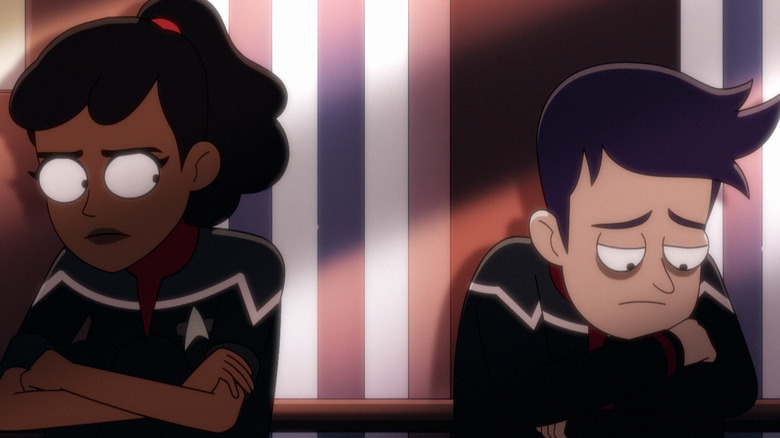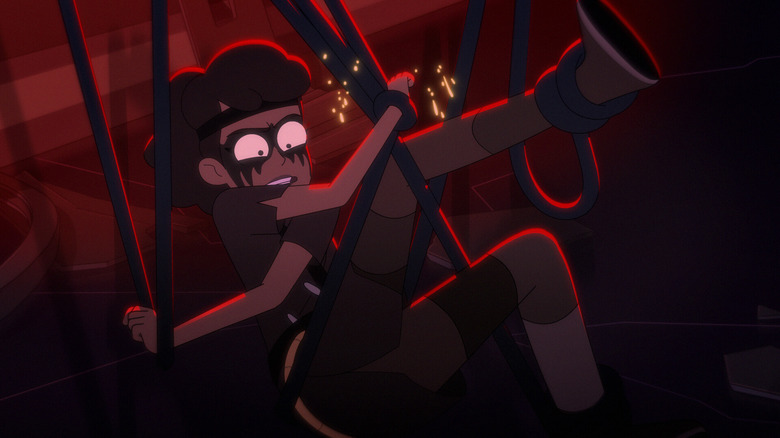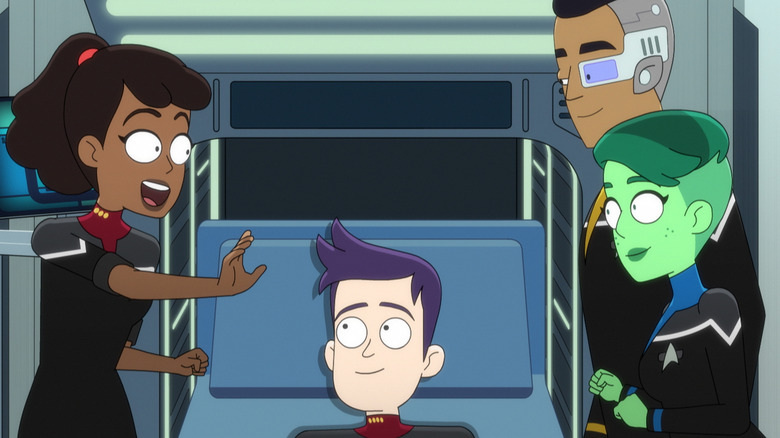Star Trek: Lower Decks May Be A Comedy, But It Isn't Afraid To Get Real
This article contains spoilers for the latest episode of "Star Trek: Lower Decks."
Adult animation in America is kind of a strange thing, because many people assume that cartoons exist only for children. While cartoon comedies for grown folks exist, they have a tendency to be ridiculous romps that rarely dig into anything particularly emotionally deep. A handful of shows have started playing with more adult themes in compelling ways, like "Rick and Morty" and "Harley Quinn," and the latest to join the ranks is "Star Trek: Lower Decks," boldly going where no "Star Trek" animated series has gone before: deep into its feelings.
In the latest episode of "Lower Decks," "Crisis Point 2: Paradoxus," Ensign Bradward Boimler (Jack Quaid) is excited to show his friends the new holodeck program he designed to serve as a sequel to his "movie" that Mariner (Tawny Newsome) took over for herself in the season 1 episode "Crisis Point." The only problem is that he receives some devastating news that completely changes how he feels about his program and challenges how he feels about life in general. "Lower Decks" ends up taking him through a powerful journey of accepting grief and growing from it. All of this from a cartoon that showed us a robot and a bird guy getting down and dirty behind a waterfall last week. "Star Trek: Lower Decks" contains multitudes.
Not your usual cartoon character arcs
Despite only existing in two dimensions, the crew of the USS Cerritos are surprisingly three-dimensional characters. The lower deckers are some of the best new "Star Trek" characters in years, in part because they're flawed individuals who are allowed to grow and change. Season 3 has followed ensigns Boimler, Mariner, Tendi (Noël Wells), and Rutherford (Eugene Cordero) as they navigate not only second contacts, rescue missions, and the far reaches of the Alpha Quadrant, but their own personal growth. It's easy to let cartoons stay locked into their same routines because they're by their very nature changeless, but "Lower Decks" is interested in making them more fully fleshed-out.
In "Crisis Point," Mariner ends up using the holodeck program to work through her trust issues, literally fighting a version of herself that forces her to confront the mental health issues she's been running from. She turns the holodeck and Boimler's movie into a kind of therapy, challenging her own preconceptions of herself and coming out of the other side of things with a new kind of self-awareness. Her experiences in the holodeck help her repair her relationship with her mother, Captain Freeman (Dawnn Lewis) and even give her a chance at a healthy romance with Jennifer the Andorian.
Lots of people in "Star Trek" use the holodeck for kinky reasons, but using it for some mind-blowing, truly thought-provoking therapy? That's genius.
Bold Boimler tackles his grief
After Boimler is given the news that his teleporter clone died in a horrific but ultimately mundane accident, he is truly shaken. He believes in the power of the Federation, in the values of Starfleet and all they represent, and he has a hard time processing the fact that the version of himself who was succeeding in wild ways could die in such a non-heroic moment, taken out by a gas leak in his sleep. When Boimler starts asking questions about the vision of Kirk's heaven, why Sulu is there, and what's going on, Sulu gives him the beatific answer: "The horses need feeding."
In the end, it doesn't matter whether he's really in Idaho, or the afterlife, or if it's just Boimler's brain trying to give him some catharsis. What matters is the moment. Boimler barely gets a second to process his feelings before he launches into a series of nerdy questions for Sulu, but it's a great moment because the least emotionally mature lower decker finally gets his chance to grow. Likewise, the show's sweet and innocent Tendi discovered that she has what it takes and wants to be in a command position. Both of them are growing in huge ways, and Mariner and Rutherford have had their own moments this season, too.
Boimler and Mariner have each basically used the holodeck for their own crash course in cognitive behavioral therapy, forcing themselves to face their demons head-on. While real-world therapists don't have that kind of technology, the experience does mirror how therapy works in real life. In order to grow, you have to look directly at the things that are holding you back. All of this from a show that occasionally solves problems with shirtlessness. That's the power of "Star Trek," baby.


